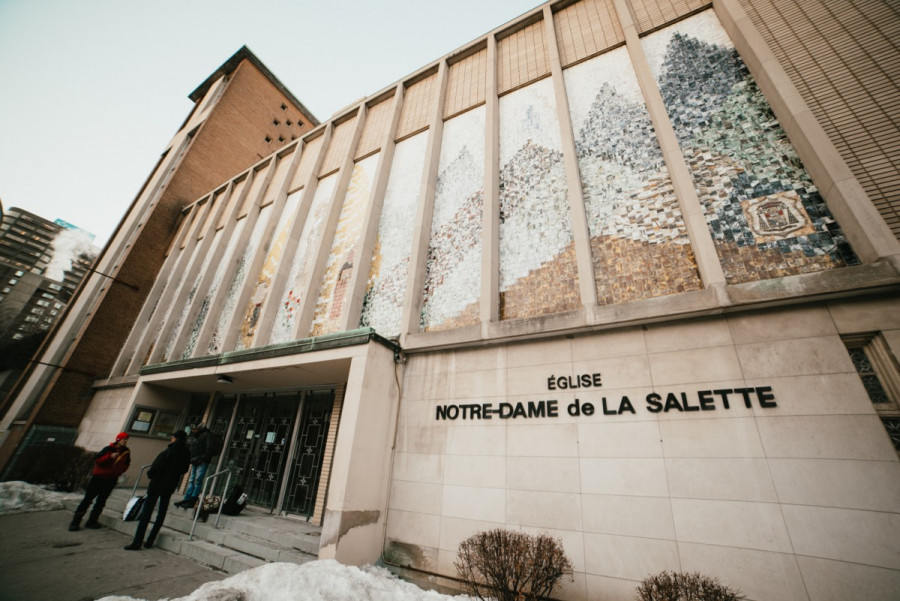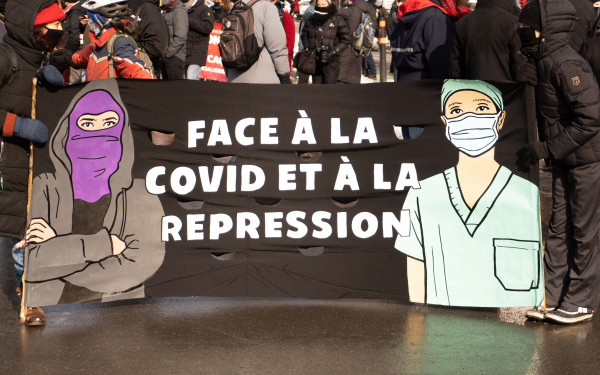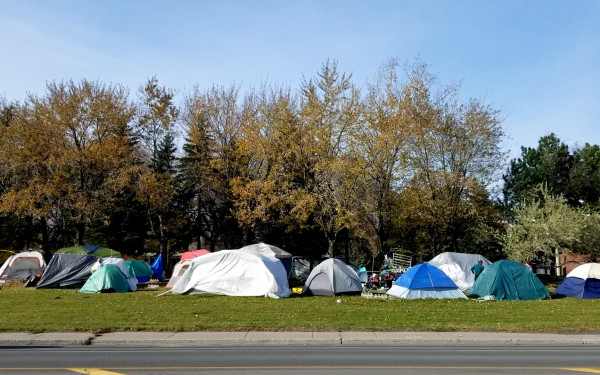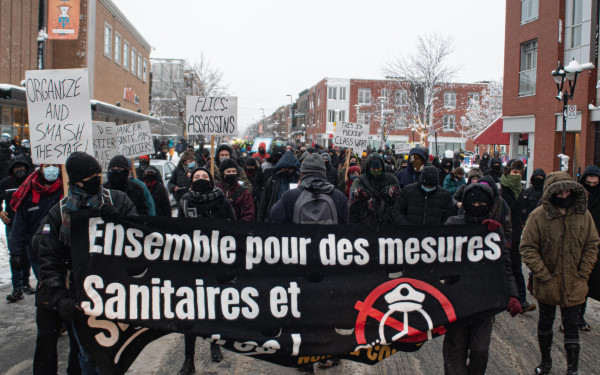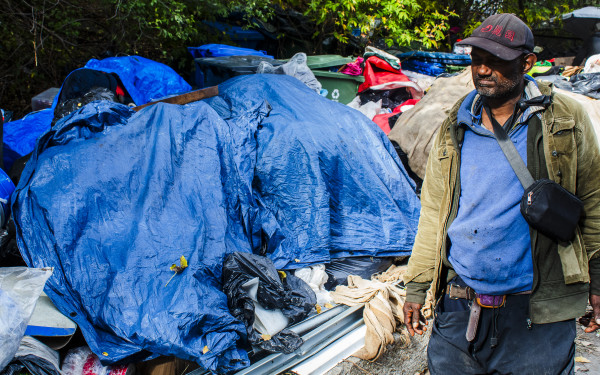Student-led initiatives work hands-on with communities to help the unhoused
How smaller organizations make a big difference
Montreal Mayor Valérie Plante has been promising an increase in the development of social housing for years, with the pandemic only exacerbating the need for them. Steep hikes in rent and inflation have severely affected the welfare of the city’s residents and public discourse on how to tackle the issue is only growing.
There are an estimated 4,000 unhoused people in Montreal that don’t have the luxury of waiting for Plante’s promise to come to fruition. As people’s frustration on the slow response of the government has grown, so has the need for community support.
As a student it can be overwhelming when starting to consider ways in which to help the vulnerable. Juggling a busy school schedule with work and other responsibilities often leaves very little time for people. Working with student-led initiatives, or smaller organizations, are a reminder that students don’t need to spare much time to make a difference. These three organizations are one of many where students are invited to participate, having continuously helped the unhoused community over the past two years.
Mobilizing for Milton-Parc
Mobilizing for Milton-Parc works with Indigenous and non-Indigenous led organizations by supporting the unhoused population in the Milton-Parc area. Their Facebook group offers a volunteer sign-up sheet and posts any additional requests and updates, making it easy for people to get involved.
"You don’t need to run the show yourself. Show up for projects you care about within your means,” said Sophie Hart, who started the initiative in the fall 2020. “That could be sharing [organizations] callouts on your social media, volunteering your time, or sharing financial support.”
Hart, a fourth year McGill student, started M4MP by approaching the many people she would see around the Milton park area and asking how she can help out.
“I wanted community members to know they were loved and cared for during what felt like apocalyptic times in the first wave of the pandemic,” she said. “People were isolating in their homes and often didn’t think about others who didn’t have the privilege to go home to anywhere of their own.”
Hart has always wanted to ensure that those who do not have that same privilege know they are still loved and cared for.
“We believe that we have a duty as settler allies to share knowledge, resources, and calls to action to support our community which we will amplify through our social media platforms.” — Sophie Hart
M4MP works directly with the community and with organizations such as The Open Door and Projets Autochtones du Québec. Each month, Hart sends out a sign-up sheet listing various activities people can volunteer for, such as book drives, movie nights at Hotel Dieu, and donation collections. In January, volunteering activities had to be adjusted due to the highly transmissible COVID-19 Omicron variant and instead focused on food preparations for The Open Door and the PAQ.
M4MP doesn’t just focus on food and material support, they also work on community building and settler education projects.
“We believe that we have a duty as settler allies to share knowledge, resources, and calls to action to support our community which we will amplify through our social media platforms,” said Hart.
McGill Students for the Open Door Montreal
With a mission to build bridges between the McGill community and shelters, McGill Students for the Open Door Montreal connects the university’s students with The Open Door who are interested in helping the vulnerable. The idea for the initiative came to co-founders Wimmy Miller and Maya Reingold while volunteering at the shelter at the start of the pandemic. After about a year of working to get everything off the ground, MSTODM became an active club in September 2021.
The founders know how overwhelming things can get for people during the school year. To help accommodate those with a full schedule, all that’s asked for as a minimum requirement to be considered an active volunteer is two shifts a month with the option to work as little as two hours at a time.
“A lot of people really want to help but aren't sure how,” said Reingold. “We figured that this club would pose as an opportunity for students to be able to contribute to a cause that they feel passionate about, that they want to help with, but they’re not sure how.”
Miller and Reingold understand how a little guidance can go a long way when looking for ways to lend a hand. Aware that the biggest barrier people face when looking to volunteer their time is uncertainty on how to go about it, MSTODM offers more than just a connection to the Open Door.
“We host training sessions where we try to give students a feel of what the environment’s like and give them a couple of scenarios on how to interact with clients,” said Miller. “We really try to give students a picture of what they’re heading into before fully committing.”
With three types of shifts to choose from, volunteers can find the kind of work that best suits them. From working in the kitchen, to organizing and sorting clothing donations, to front desk shifts, MSTODM is an excellent opportunity for students looking to get their foot in the door as a volunteer. Though the club works exclusively with students from McGill, Miller and Reingold encourage anyone who wants to help out in some way to reach out to The Open Door directly.
Community Cooks Collective
Created to address food insecurity within Montreal, Community Cooks Collective was launched in April 2020 in response to the pandemic. The idea took off when Tomo Newton, the collective’s founder, responded to a volunteer call-out from Resilience Montreal. Since being launched, the CCC has also started working with The Open Door, located in the Plateau area.
Newton started organizing weekly Zoom cooking sessions for anyone who wanted to virtually meet up and prepare meals for the shelter as a team. With a few recipes on rotation, the CCC has a pickup point each Saturday for anyone who needs ingredients. Volunteers will then prepare the meal of the week in their own kitchens with the option of joining in on the Zoom call on Sunday evenings.
Despite Zoom fatigue two years into the pandemic, there are usually around 15 people meeting online to work together.
“It’s been really rewarding,” said Hyacinth Wourms, a member of CCC since fall 2020. “People love to cook and love to see that their labour is very tangible. They love seeing what [their work] is doing and where it’s going.”
“Cooking can be a very racialized issue. Access to food in general is more complicated by intersections of race or class.” — Hyacinth Wourms
Working with Chasseurs Courriers, a 100 per cent bicycle run delivery service, volunteers who live within a certain zone can choose to have their prepared meals picked up by a carrier and dropped off for them. Those who live outside of the limits can choose to drop off their meals to the shelters directly on Monday mornings, or they work out a drop off point with whoever is managing that week’s meal preparation for Sunday evenings .
The Collective takes these extra steps to make volunteering as easy as possible for people while also making effort to find food that is culturally relevant for different community groups across town.
“Cooking can be a very racialized issue. Access to food in general is more complicated by intersections of race or class," said Wourms, adding that is something the CCC thinks about when choosing recipes.
The CCC’s mandate highlights issues with systematic inequalities and is continuously working to be more inclusive and accessible to underrepresented communities.

